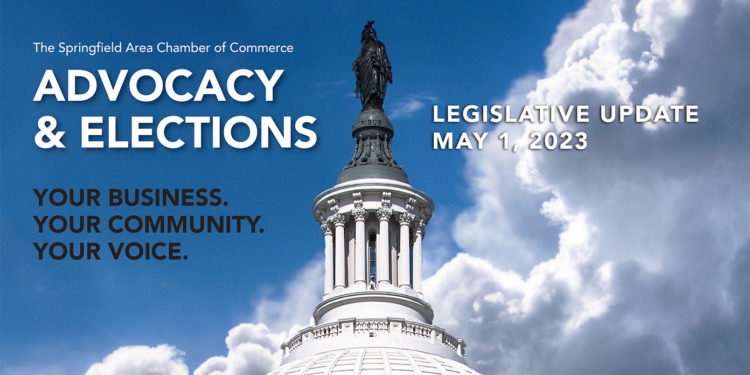Legislative Update: May 1, 2023

We’re monitoring Oregon’s 2023 legislative session for issues of impact and interest to our members. Here’s the latest update from our legislative counsel at the Oregon State Chamber of Commerce (OSCC).
This week is expected to be the most contentious week of the session.
The House will take up two bills – HB 2002 and HB 2005 – both dealing with hot-button social issues. The House has cancelled all committees for Monday and Tuesday.
The Senate, in the meantime, has its own contentious bill – SJR 33 – which is also a flashpoint for Senate relationships.
We expect procedural delays in both the House and Senate. This past week there were growing rumblings that Republicans, especially in the Senate, could take off for a few days or maybe even longer. It is unknown how this next week will play out and the impact that HB 2002 and HB 2005 will have on other bills that are remaining. We would expect discussion around these bills, at the very least, to slow the movement on other priorities in the building.
But HB 2002 and HB 2005 notwithstanding, the legislature is grinding along at a slow pace. Part of the reason is that relatively few policy bills have passed, and there simply is not a lot of work for the committees to do. But the second, most important issue is that the legislature seems to be on “pause” until May 17th. This is the date that the state economists release the final revenue forecast.
An unusually large number of bills are currently parked in the Ways & Means Committee waiting for the May 17th revenue forecast. If the revenue forecast yields no additional revenue, we expect the vast majority of those bills to die for lack of funding.
Unless the legislature decides to dip into the state’s ‘rainy day’ funds, it is unlikely the legislature will have much discretionary cash.
As a reminder, policy committees will begin the process of shutting down on Friday. For bills to advance, they must be posted for a work session by this Friday, May 5th. Committees with then have until May 19th to advance bills and either approve them to the floor or transfer them to Rules, Revenue, or the Ways & Means Committee.
Either way, May 19th is the last day for policy committees.
CURRENT OSCC ISSUES
Interstate Bridge Replacement (HB 2098): Establishing a plan for funding Oregon’s portion of the I-5 bridge replacement project is quickly becoming the focal point of the remaining weeks of this year’s session. Last week saw the first major public hearing on amendment language related to the project. Already, typical battle lines over union work requirements, tolling, project costs, and environmental impacts have come to the fore. OSCC is supportive of efforts to leverage the availability of significant one-time federal funds available to help complete the replacement of the current bridge, which has reached the end of its lifespan and is considered seismically unsafe.
Restrictions on Production Quotas in Warehouses (HB 3568): OSCC is currently concerned with this bill as it assumes that workplace production quotas lead to unsafe workplaces. We are also concerned that the bill creates a cycle of potential retaliatory complaints against warehouse employers who use production or fulfillment quotas as a workplace management or productivity tool. OSCC opposes the bill in current form.
First party lawsuits on insurance claims (HB 3242 and HB 3243): Allows policy holders to sue their insurance companies for bad faith. These bills have been tried in other states and have benefitted few but resulted in significant premium spikes in commercial policies for all. These bills passed the House on party-line votes. OSCC will oppose these bills in the Senate.
DEQ Title V permit fees (HB 3229): This bill is a massive 80% increase in Title V air emissions fees implemented by DEQ. Will hurt local manufacturers as permit costs are increased to save DEQ regulator positions. The bill also allows DEQ to raise additional fees without legislative approval. OSCC opposes this bill in current form.
Alignment of Employee Leave Policies (SB 999): This bill undertakes the work of aligning disparate employee leave policies (OFLA, FMLA, and Paid Leave) to ensure that these laws do not allow employees to “stack” these protected leaves. OSCC supports this legislation.
The Springfield Chamber of Commerce will be publishing the OSCC’s legislative updates weekly, or as received. Any opinions expressed or implied are those of OSCC and do not necessarily reflect those of the Springfield Chamber or its representatives. If you’d like more information, please visit our Advocacy & Elections Page.
Discover more from Springfield Bottom Line
Subscribe to get the latest posts sent to your email.




